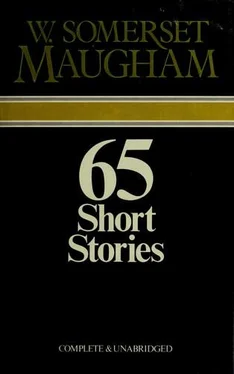Somerset Maugham - Sixty-Five Short Stories
Здесь есть возможность читать онлайн «Somerset Maugham - Sixty-Five Short Stories» весь текст электронной книги совершенно бесплатно (целиком полную версию без сокращений). В некоторых случаях можно слушать аудио, скачать через торрент в формате fb2 и присутствует краткое содержание. Жанр: Фантастика и фэнтези, на русском языке. Описание произведения, (предисловие) а так же отзывы посетителей доступны на портале библиотеки ЛибКат.
- Название:Sixty-Five Short Stories
- Автор:
- Жанр:
- Год:неизвестен
- ISBN:нет данных
- Рейтинг книги:4.5 / 5. Голосов: 2
-
Избранное:Добавить в избранное
- Отзывы:
-
Ваша оценка:
- 100
- 1
- 2
- 3
- 4
- 5
Sixty-Five Short Stories: краткое содержание, описание и аннотация
Предлагаем к чтению аннотацию, описание, краткое содержание или предисловие (зависит от того, что написал сам автор книги «Sixty-Five Short Stories»). Если вы не нашли необходимую информацию о книге — напишите в комментариях, мы постараемся отыскать её.
Sixty-Five Short Stories — читать онлайн бесплатно полную книгу (весь текст) целиком
Ниже представлен текст книги, разбитый по страницам. Система сохранения места последней прочитанной страницы, позволяет с удобством читать онлайн бесплатно книгу «Sixty-Five Short Stories», без необходимости каждый раз заново искать на чём Вы остановились. Поставьте закладку, и сможете в любой момент перейти на страницу, на которой закончили чтение.
Интервал:
Закладка:
'Has she got the letter?' asked Mr Joyce.
'Yes, sir.'
Crosbie said nothing, but produced a roll of five-hundred-dollar notes. He counted out twenty and handed them to Chi Seng.
'Will you see if that is correct?'
The clerk counted them and gave them to the fat Chinaman.
'Quite correct, sir.'
The Chinaman counted them once more and put them in his pocket. He spoke again to the woman and she drew from her bosom a letter. She gave it to Chi Seng who cast his eyes over it.
'This is the right document, sir,' he said, and was about to give it to Mr Joyce when Crosbie took it from him.
'Let me look at it,' he said.
Mr Joyce watched him read and then held out his hand for it.
'You'd better let me have it.'
Crosbie folded it up deliberately and put it in his pocket.
'No, I'm going to keep it myself. It's cost me enough money.'
Mr Joyce made no rejoinder. The three Chinese watched the little passage, but what they thought about it, or whether they thought, it was impossible to tell from their impassive countenances. Mr Joyce rose to his feet.
'Do you want me any more tonight, sir?' said Ong Chi Seng.
'No.' He knew that the clerk wished to stay behind in order to get his agreed share of the money, and he turned to Crosbie. 'Are you ready?'
Crosbie did not answer, but stood up. The Chinaman went to the door and opened it for them. Chi Seng found a bit of candle and lit it in order to light them down, and the two Chinese accompanied them to the street. They left the woman sitting quietly on the bed smoking a cigarette. When they reached the street the Chinese left them and went once more upstairs.
'What are you going to do with that letter?' asked Mr Joyce.
'Keep it.'
They walked to where the car was waiting for them and here Mr Joyce offered his friend a lift. Crosbie shook his head.
'I'm going to walk.' He hesitated a little and shuffled his feet. 'I went to Singapore on the night of Hammond's death partly to buy a new gun that a man I knew wanted to dispose of. Good night.'
He disappeared quickly into the darkness.
Mr Joyce was quite right about the trial. The assessors went into court fully determined to acquit Mrs Crosbie. She gave evidence on her own behalf. She told her story simply and with straightforwardness. The D.P.P. was a kindly man and it was plain that he took no great pleasure in his task. He asked the necessary questions in a deprecating manner. His speech for the prosecution might really have been a speech for the defence, and the assessors took less than five minutes to consider their popular verdict. It was impossible to prevent the great outburst of applause with which it was received by the crowd that packed the courthouse. The judge congratulated Mrs Crosbie and she was a free woman.
No one had expressed a more violent disapprobation of Hammond's behaviour than Mrs Joyce; she was a woman loyal to her friends and she had insisted on the Crosbies staying with her after the trial, for she in common with everyone else had no doubt of the result, till they could make arrangements to go away. It was out of the question for poor, dear, brave Leslie to return to the bungalow at which the horrible catastrophe had taken place.
The trial was over by half past twelve and when they reached the Joyces' house a grand luncheon was awaiting them. Cocktails were ready, Mrs Joyce's million-dollar cocktail was celebrated through all the Malay States, and Mrs Joyce drank Leslie's health. She was a talkative, vivacious woman, and now she was in the highest spirits. It was fortunate, for the rest of them were silent. She did not wonder; her husband never had much to say, and the other two were naturally exhausted from the long strain to which they had been subjected. During luncheon she carried on a bright and spirited monologue. Then coffee was served.
'Now, children,' she said in her gay, bustling fashion, 'you must have a rest and after tea I shall take you both for a drive to the sea.'
Mr Joyce, who lunched at home only by exception, had of course to go back to his office.
'I'm afraid I can't do that, Mrs Joyce,' said Crosbie. 'I've got to get back to the estate at once.'
'Not today?' she cried.
'Yes, now. I've neglected it for too long and I have urgent business. But I shall be very grateful if you will keep Leslie until we have decided what to do.' Mrs Joyce was about to expostulate, but her husband prevented her. 'If he must go, he must, and there's an end of it.'
There was something in the lawyer's tone which made her look at him quickly. She held her tongue and there was a moment's silence. Then Crosbie spoke again.
'If you'll forgive me, I'll start at once so that I can get there before dark.' He rose from the table. 'Will you come and see me off, Leslie?'
'Of course.'
They went out of the dining-room together.
'I think that's rather inconsiderate of him,' said Mrs Joyce. 'He must know that Leslie wants to be with him just now.'
'I'm sure he wouldn't go if it wasn't absolutely necessary.'
'Well, I'll just see that Leslie's room is ready for her. She wants a complete rest, of course, and then amusement.'
Mrs Joyce left the room and Joyce sat down again. In a short time he heard Crosbie start the engine of his motor-cycle and then noisily scrunch over the gravel of the garden path. He got up and went into the drawing-room. Mrs Crosbie was standing in the middle of it, looking into space, and in her hand was an open letter. He recognized it. She gave him a glance as he came in and he saw that she was deathly pale.
'He knows,' she whispered.
Mr Joyce went up to her and took the letter from her hand. He lit a match and set the paper afire. She watched it burn. When he could hold it no longer he dropped it on the tiled floor and they both looked at the paper curl and blacken. Then he trod it into ashes with his foot.
'What does he know?'
She gave him a long, long stare and into her eyes came a strange look. Was it contempt or despair? Mr Joyce could not tell.
'He knows that Geoff was my lover.'
Mr Joyce made no movement and uttered no sound.
'He'd been my lover for years. He became my lover almost immediately after he came back from the war. We knew how careful we must be. When we became lovers I pretended I was tired of him, and he seldom came to the house when Robert was there. I used to drive out to a place we knew and he met me, two or three times a week, and when Robert went to Singapore he used to come to the bungalow late, when the boys had gone for the night. We saw one another constantly, all the time, and not a soul had the smallest suspicion of it. And then lately, a year ago, he began to change. I didn't know what was the matter. I couldn't believe that he didn't care for me any more. He always denied it. I was frantic. I made him scenes. Sometimes I thought he hated me. Oh, if you knew what agonies I endured. I passed through hell. I knew he didn't want me any more and I wouldn't let him go. Misery! Misery! I loved him. I'd given him everything. He was my life. And then I heard he was living with a Chinese woman. I couldn't believe it. I wouldn't believe it. At last I saw her, I saw her with my own eyes, walking in the village, with her gold bracelets and her necklaces, an old, fat Chinese woman. She was older than I was. Horrible! They all knew in the kampong that she was his mistress. And when I passed her, she looked at me and I knew that she knew I was his mistress too. I sent for him. I told him I must see him. You've read the letter. I was mad to write it. I didn't know what I was doing. I didn't care. I hadn't seen him for ten days. It was a lifetime. And when last we'd parted he took me in his arms and kissed me, and told me not to worry. And he went straight from my arms to hers.'
Читать дальшеИнтервал:
Закладка:
Похожие книги на «Sixty-Five Short Stories»
Представляем Вашему вниманию похожие книги на «Sixty-Five Short Stories» списком для выбора. Мы отобрали схожую по названию и смыслу литературу в надежде предоставить читателям больше вариантов отыскать новые, интересные, ещё непрочитанные произведения.
Обсуждение, отзывы о книге «Sixty-Five Short Stories» и просто собственные мнения читателей. Оставьте ваши комментарии, напишите, что Вы думаете о произведении, его смысле или главных героях. Укажите что конкретно понравилось, а что нет, и почему Вы так считаете.









